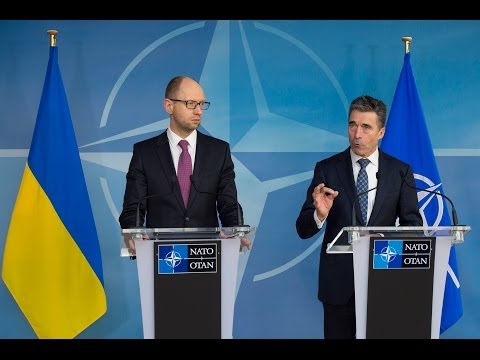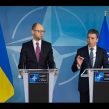
Russia, the West, and the Security Vacuum in Europe’s East (Part One)
Publication: Eurasia Daily Monitor Volume: 11 Issue: 64
By:

Russia’s seizure of Crimea from Ukraine, and Western hand-wringing in response, demonstrate the depth of the security vacuum in Europe’s East. Comprising Ukraine, Belarus, Moldova, Georgia, Azerbaijan and Armenia, this area forms the North Atlantic Treaty Organization’s (NATO) and the European Union’s direct eastern neighborhood. Yet, NATO has condemned itself to failure in terms of securing this neighborhood; while the EU and its Eastern Partnership (covering those same neighborhood countries) has neither the instruments nor the internal political consensus to become a security actor in Europe’s East.
Western default and local state weakness over the last 22 years allowed this security vacuum to develop and Russia to re-expand step by step into this former Soviet domain. The Crimea case represents an escalation of this process on at least three counts. First, Russia has now officially annexed the occupied territory (rather than occupying it de facto or “recognizing” it as “independent”). Second, Moscow explicitly reserves the right to attack mainland Ukraine (President Vladimir Putin had his parliament give him unlimited authority to use military force against Ukraine). And third, while seizing Crimea, the Kremlin has proclaimed a new doctrine of irredentism and intervention in former Soviet-ruled territories (see EDM, March 19–21).
The Crimea crisis has confirmed and further developed a paradigm of Russian re-expansion and Western self-denial in Europe’s East. This paradigm operates as follows:
1. Strategic surprises recurring. The invasion of Crimea started under the cover of far larger exercises of Russian forces all along Ukraine’s borders. This resembled the 2008 invasion of Georgia, which had developed directly from large-scale Russian exercises in the North Caucasus. Yet, Western intelligence and chains of command seemed surprised by both invasions (let alone anticipating them). According to US General Philip Breedlove, Supreme Commander of NATO forces in Europe, “large formations of [Russian] forces were brought to readiness and exercised, then stood down, and then, boom—into Crimea” (remarks at GMF’s Brussels Forum, March 23, gmfus.org). With the invasion already under way on February 27, US Defense Secretary Chuck Hagel and NATO’s Secretary General Anders Fogh Rasmussen sounded initially confused about what was happening: both appealed to Russia publicly to “not act in ways that create misunderstandings” or that “could be misinterpreted” (US Department of Defense, NATO press releases, February 27). Strategic surprise helped Russia to quickly achieve faits accomplis on the ground in Georgia and in Ukraine’s Crimea.
2. To resist is to provoke. While characterizing Russia’s actions as aggression, Ukraine had to avoid even the slightest move that Russia could construe as military resistance. Kyiv feared that just one firing incident could provoke Russia into sending troops beyond Crimea to mainland Ukraine. The government, the parliamentary parties, and the military shared this analysis. Ukraine’s western partners praised Kyiv for its total restraint, turning necessity into virtue (see EDM, March 12). This logic had first taken shape in the wake of Russia’s invasion of Georgia, not immediately but after a decent interval for moral indignation to subside. Many in the West turned to blaming Georgia’s government for resisting Russia’s initial attacks in South Ossetia and thereby “provoking” a full-scale invasion. That proposition was also used to justify regime change in Georgia. When Russian forces then built barbed-wire fences along the occupation line (“borderization”), Georgia’s new government claimed credit for “not allowing itself to be provoked” into resisting (see EDM, June 11, 12, September 23, 24, October 2, 2013). Given Russia’s crushing military superiority in a one-on-one situation, resisting a localized Russian aggression becomes tantamount to provoking a Russian invasion of the country’s interior. Western partners were reduced to praising Tbilisi’s restraint in 2013, as they did Kyiv’s one year later.
3. International law and Western assurances do not apply. International law ceased to operate in parts of Europe’s East from the early 1990s onward. Russia and its local proxies seized territories by force, conducted ethnic cleansing operations, moved de facto borders, and established military bases in territories taken from Moldova, Azerbaijan, and Georgia with impunity, before annexing Crimea from Ukraine. The Kremlin reserves the right to intervene again in other places, according to President Putin’s March 18 speech. Ukraine continually invokes the 1994 Budapest Memorandum, which seemingly provides US, British, and indeed Russian assurances to protect Ukraine’s security, territorial integrity and internationally recognized borders. That document, however, has Russia as a co-author, and is so written as to be inapplicable in practice from the outset, despite its solemnly-sounding language (see EDM, March 10).
4. NATO AWOL. The 1997 NATO-Ukraine Distinctive Partnership Charter had promised a consultative mechanism to deal with threats to Ukraine’s territorial integrity and security. Russia attempted in 2003 to seize Tuzla Island in the Kerch Strait forcibly from Ukraine, but NATO’s then secretary general, George Robertson, pronounced that to be a bilateral matter between Russia and Ukraine. The Ukraine-NATO mechanism has not operated in the 2014 Crimea crisis either, although Ukraine substantially contributes to NATO-led operations elsewhere. On February 27, the North Atlantic Alliance reaffirmed its full respect for Ukraine’s territorial integrity. Queried, Secretary General Rasmussen explained, “We just used this opportunity to repeat what we said many years ago in our founding documents” (press release, February 27)—i.e., verbal support. While Georgia and even Moldova have participated in NATO peacekeeping missions in third countries, Russia continually enjoys a “peacekeeping” monopoly in Moldova itself since 1992; and it enjoyed the same monopoly in Georgia from 1992 through 2008, when Russia converted its peacekeeping operation officially into an occupation of Georgia’s territories.
*Read Part Two here.




